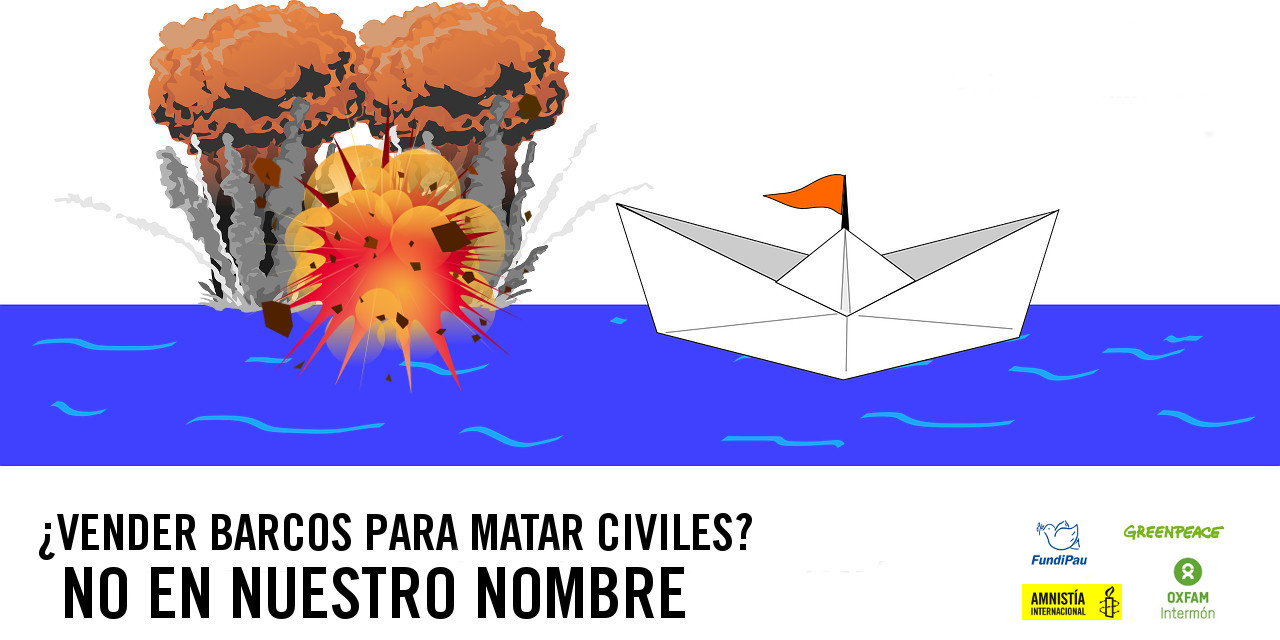As King Felipe VI prepares to travel to Saudi Arabia this weekend
- NGOs warn of the risk of complicity in atrocities in Yemen
- NGOs demand arms exports to Saudi Arabia be refused, more parliamentary scrutiny and further transparency in the arms trade
Comunicado de prensa en castellano
Amnesty International, FundiPau, Greenpeace and Oxfam Intermón, the NGOs leading the Control Arms campaign in Spain, have reiterated their opposition to the sale of five Avante 2200 corvettes for the Saudi navy to be built by the Spanish company Navantia. The signature of the agreement between Navantia and Saudi Arabia to build these warships -fitted with guns of different calibre, missiles, torpedoes and which can carry a combat helicopter-, could be facilitated during King Felipe’s visit to Saudi Arabia from 14 to 16 January.
The NGOs warn the government that, if this operation is carried out, Spain could be complicit in atrocities in the conflict in Yemen, due to the clear risk that the corvettes could be used for direct military attacks against the civilian population, indiscriminate attacks or to maintain the naval blockade imposed by Saudi Arabia on Yemen since 25 March 2015, which is preventing access to humanitarian assistance. All of these practices are serious violations of international law. According to the UN, more than 7,000, half of them civilians, had been killed and over 38,000 injured in the conflict in Yemen by the end of 2016.
Esteban Beltrán, Director of Amnesty International, said “Any potential arms sale to Saudi Arabia which could be in Yemen is illegal because it breaches Spanish and international law on arms trade”. Beltrán asked the government “not to authorise arms sales to this country while there remains a substantial risk that they could be use to commit or facilitate serious violations of international law or be diverted”.
Chema Vera, Director of Oxfam Intermón highlighted the “humanitarian catastrophe caused by the war in Yemen, where over 21 million people need humanitarian assistance to cover their basic needs, in a crisis exacerbated by the naval blockade of Yemen”. The Saudi-led coalition has bombed schools, hospitals, markets and mosques and has acknowledged using cluster munitions in a conflict in which all parties have committed serious violations and abuses which should be investigated as alleged war crimes.
Mario Rodríguez, Director of Greenpeace, said that “in the last decade Spain has sold arms to Saudi Arabia, the second largest global importer of arms between 2011 and 2015, worth almost 1,400 million Euros”. He urged the government to investigate “whether the Spanish ammunition, mortar shells, bombs, torpedoes, rockets, missiles, planes and armoured vehicles exported to Saudi Arabia have been used to kill innocent civilians in Yemen” and recalled the reports about the presence of Alhambra grenades and C90-CR rocket launchers manufactured by the Spanish company Instalaza in the hands of the Houthi rebels.
According to Jordi Armadans, Director of FundiPau, “the discussion cannot be reduced to jobs at the expense of the lives of innocent civilians in Yemen” and demands the government and Parliament “courage and long-term vision to have a serious discussion on the impact of arms exports and a real commitment with peace and respect for international law”. He also called on them to adopt measures to improve scrutiny and transparency of the arms trade to ensure Spain observes its obligations under international and Spanish law as well as EU standards, which prohibit the sale of arms for atrocities.
In January 2016, the four NGOs wrote to Navantia and the then acting Prime Minister to express their opposition to this operation, which is illegal under international and Spanish law. They again wrote a letter with their concerns to the Spanish monarch and government before their failed November 2016 trip to Saudi Arabia.
Under Article 8.1 of the Spanish law on arms trade, arms export licences will be denied “when there are reasonable grounds that they would be used in actions disturbing peace (…), exacerbating tensions or conflicts (…), be used for internal repression or in situations of violation of human rights, be bound for countries where there is evidence of diversion of the transferred equipment”. Also, Article 6 of the Arms Trade Treaty, ratified by Spain in 2013, prohibits arms sales if has knowledge, at the time of authorization –such as in this case- “that the arms would be used in the commission of genocide, crimes against humanity, grave breaches of the Geneva Conventions of 1949…or other war crimes”.
//ENDS



